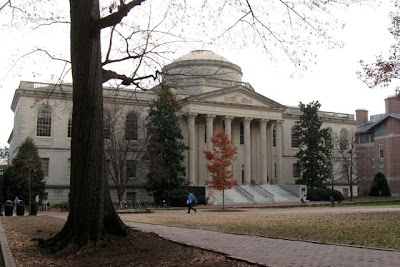DCAPE's goal is to build a trustworthy and geographically distributed system that automates many of the processes associated with taking in and managing archival electronic records and ensuring that the records are preserved appropriately. The main system will be built by RENCI and the Data Intensive Cyber Environments group within, and two other institutions -- West Virginia University and Carleton University (which is not receiving grant funding) -- will maintain identical systems.
Guidance concerning the functional requirements of the system and sample records used to test its workings will be provided by archivists from an array of repositories:
- California State Archives
- Getty Research Institute
- Kansas Historical Society
- Kentucky Department for Libraries and Archives
- State Archives of Michigan
- North Carolina State Archives
- New York State Archives
- Tufts University Archives
 We met on the third floor of the Wilson Library, which houses the university's music library and manuscript and rare books collections, in a meeting room just off the library's exhibit space; as a result, we got to see Presenting John Keats, a display of first editions and elegantly bound volumes mounted in honor of the university libraries' acquisition of their six millionth volume, during our breaks.
We met on the third floor of the Wilson Library, which houses the university's music library and manuscript and rare books collections, in a meeting room just off the library's exhibit space; as a result, we got to see Presenting John Keats, a display of first editions and elegantly bound volumes mounted in honor of the university libraries' acquisition of their six millionth volume, during our breaks.We spent a good portion of the morning discussing iRODS, the software that will drive the system that SILS and RENCI are building. I'm still trying to wrap my mind around precisely how it works (and have the feeling that I will continue to do so for some time), but iRODS is designed to allow users to create rules that govern how records will be handled by the system; for example, it's possible to write a rule that instructs the system to perform integrity checks on each record, compare the results with those of past integrity checks, and perform a specific action in the event that a discrepancy is discovered.
We also discussed how the archivists involved in the project will go about defining the functional requirements that the system should incorporate. We'll need to continue this discussion tomorrow.
We also got to talk informally, which I consider essential to the success of any collaborative project, over lunch at the Top of the Hill and dinner at the Carolina Inn's Carolina CrossRoads, both of which are Chapel Hill institutions. Although many of us know each other from past projects or from SAA or the Best Practices Exchange, this project is pretty large and not everyone knows each other pretty well. Over meals, we got to share news about the other stuff we're working on, trade war stories, and talk about the increasingly severe budget constraints that almost all of us face.





No comments:
Post a Comment